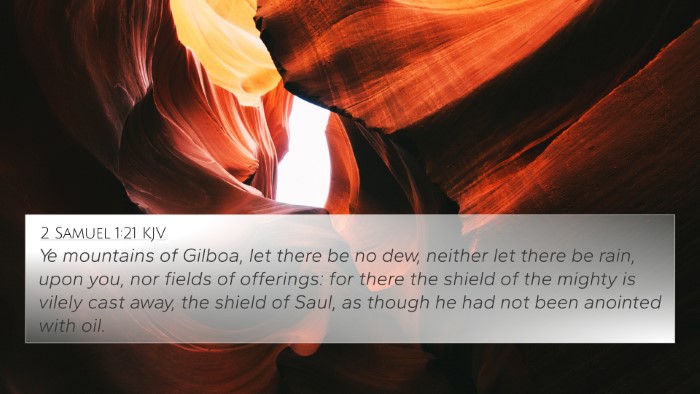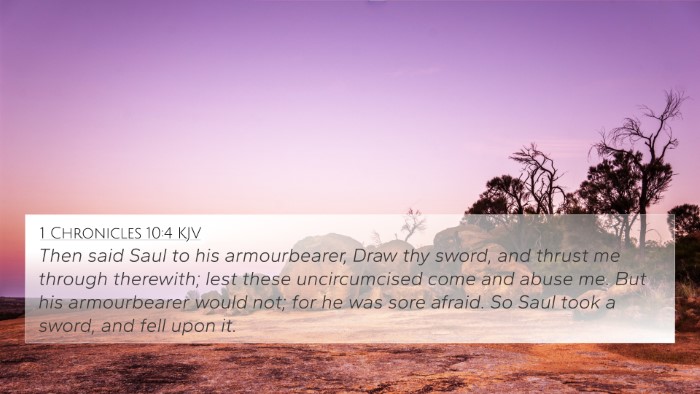Understanding 2 Samuel 1:6
Bible Verse: 2 Samuel 1:6
Meaning: In this verse, David learns about Saul's death from an Amalekite who claims to have killed him. This moment is pivotal as it marks a significant transition in leadership in Israel and sets the stage for David's ascension to the throne.
Interpretative Insights from Public Domain Commentaries
Matthew Henry's Commentary
Matthew Henry highlights the tragic nature of Saul's death and the Amalekite's role in it, illustrating the moral implications of victory and defeat. The Amalekite, believing he has brought good news to David, underestimates the complexity of his claim, as Saul's death was not merely a fact of war but a fulfillment of God's judgment against him. This commentary emphasizes the theme of divine justice and the consequences of disobedience, aligning with the broader narrative of Israel's tumultuous history.
Albert Barnes' Notes on the Bible
Albert Barnes focuses on the deception of the Amalekite, pointing out that while he presented himself as a bearer of good news, his actions were rooted in self-interest. This reflects the broader biblical principle that God remains sovereign, and the news of Saul’s death, while it may seem beneficial to David, comes with heavy moral weight. Barnes draws attention to the Persian kings' perspective of warfare and kingship, indicating that the Amalekite’s assumption of honor was misplaced and would lead to dire consequences.
Adam Clarke's Commentary
Adam Clarke elaborates on the historical and cultural backdrop of the Amalekite's claim. Clarke points to the tragic irony that the Amalekite believed he would gain favor from David, who had a deep respect for Saul despite their contentious relationship. He emphasizes that David's response showcases his character—grieving for a king he honored, despite Saul's previous attempts to kill him. This reflection reveals a profound understanding of loyalty, honor, and the weight of kingship in biblical narratives.
Cross-References to 2 Samuel 1:6
This verse can be linked to several other biblical texts to enhance understanding:
- 1 Samuel 15:33 - God's rejection of Saul as king serves as a backdrop for understanding Saul's death.
- 2 Samuel 1:11-12 - David's lamentation over Saul and Jonathan, showcasing his grief and respect for them.
- 1 Samuel 31:4-5 - The account of Saul's death from the perspective of the battle against the Philistines.
- 2 Samuel 4:10 - The consequences for the Amalekite, highlighting the idea of justice and accountability.
- Exodus 17:14-16 - The historical enmity between Israel and the Amalekites is rooted here.
- Psalm 52:1-5 - A reflection on the fate of those who boast in evil, relevant to the Amalekite's claim.
- Jeremiah 22:30 - Proclaims judgment on Jeconiah, linking to themes of leadership and divine reckoning.
- Romans 12:19 - New Testament insight into vengeance and God's role in justice, contrasting David’s earthly kingly perspective with divine justice.
Thematic Connections in Scripture
2 Samuel 1:6 serves as a crucial hinge between Saul's failure as a king and David's emergence as the leader of Israel. This transition can be viewed through several themes:
- The Sovereignty of God: Both Saul's downfall and David's rise emphasize God's control over human affairs.
- Divine Judgment: Saul's death is not merely a political event but the culmination of his disobedience to God (1 Samuel 15).
- Loyalty and Honor: David's response to Saul’s death showcases the complexities of loyalty in leadership.
- Good News vs. False Claims: The Amalekite illustrates how perceptions of good news can differ drastically depending on the perspective.
- Leadership Transition: The passage signifies the shifts in power and the expectations of a ruler in Israel.
Applying Cross-Referencing for Deeper Understanding
Utilizing a Bible concordance or a Bible cross-reference guide can greatly aid in drawing connections across scripture. Here are some tools and methods for effective cross-referencing:
- Identifying connections: Study key themes and narratives that align with 2 Samuel 1:6.
- Utilize a Bible reference resource: Find parallels and similarities between related verses.
- Engage in cross-reference Bible study: This method allows for a thorough comparative Biblical analysis.
- Explore thematic Bible verse connections: Understand how 2 Samuel 1:6 fits into the larger narrative of Israel’s history.
Conclusion
2 Samuel 1:6 serves as a powerful reminder of the complexities within God's narrative of Israel. By exploring cross-references and thematic connections, readers can gain a deeper understanding of the profound implications of this and related verses. Engaging with public domain commentaries enriches the interpretive journey, providing less understood dimensions of the text.









